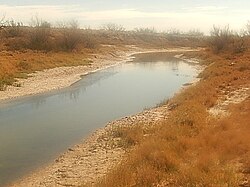Horsehead Crossing
| Horsehead Crossing | |
|---|---|

Horsehead Crossing as it appears in 2014
|
|
| Type | Ford |
| Location | Pecos County, Texas |
| Nearest city | Girvin, Texas |
| Coordinates | 31°14′08″N 102°29′02″W / 31.235556°N 102.483889°WCoordinates: 31°14′08″N 102°29′02″W / 31.235556°N 102.483889°W |
| Elevation | 2,316 feet (706 m) |
| Governing body | State of Texas |
| Official name: Horsehead Crossing on the Pecos River | |
| Designated | 1936 |
| Marker Number | 2564 |
| Atlas Number | 5371002564 |
Horsehead Crossing is a ford on the Pecos River in Crane County, southeast of Odessa, Texas. Historically it was a major landmark on the trail west as one of a few fordable sections of the Pecos in West Texas, and as the first reliable source of water for about 75 miles on the route from the east.
The location as marked by a state historical marker is 31°14' N, 102°29' W, though there is debate as to possible alternate locations in that area. U.S. Geological Survey locates it at 31°14′08″N 102°29′02″W / 31.23556°N 102.48389°W.
Horsehead Crossing was the primary crossing on the Pecos for the Comanche Trail from the Llano Estacado south to Mexico. It was probably a prehistoric crossing by earlier Native Americans.
The ford was mapped in 1849 by Randolph B. Marcy, commander of an army escort for parties on their way to California on the San Antonio-El Paso Road. In 1858, the crossing became an important stop on the Butterfield Overland Mail route from St. Louis to San Francisco. In 1866, Charles Goodnight and Oliver Loving blazed their famous cattle trail, which came to this point and turned upriver.
...
Wikipedia

